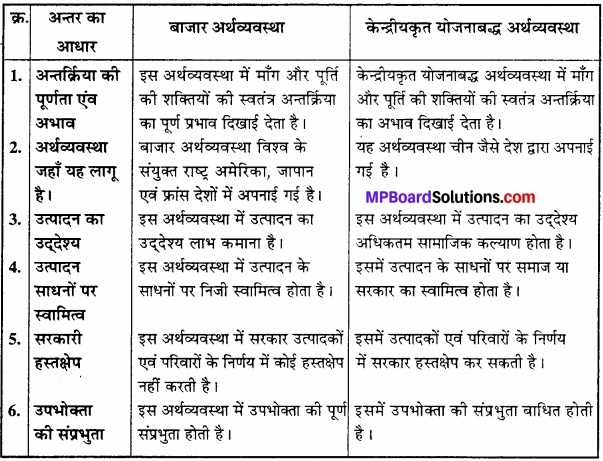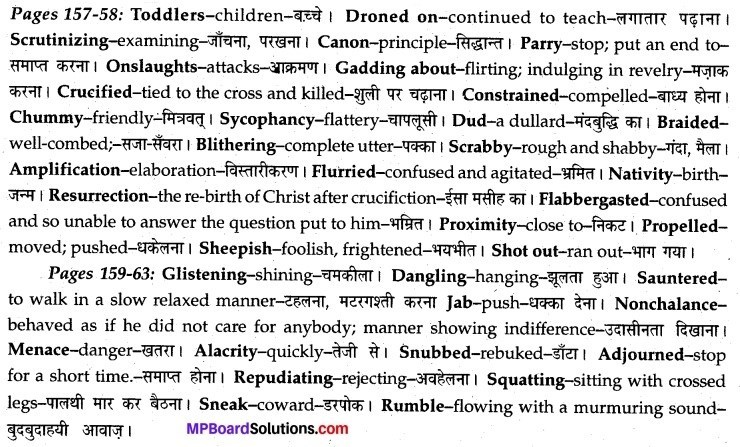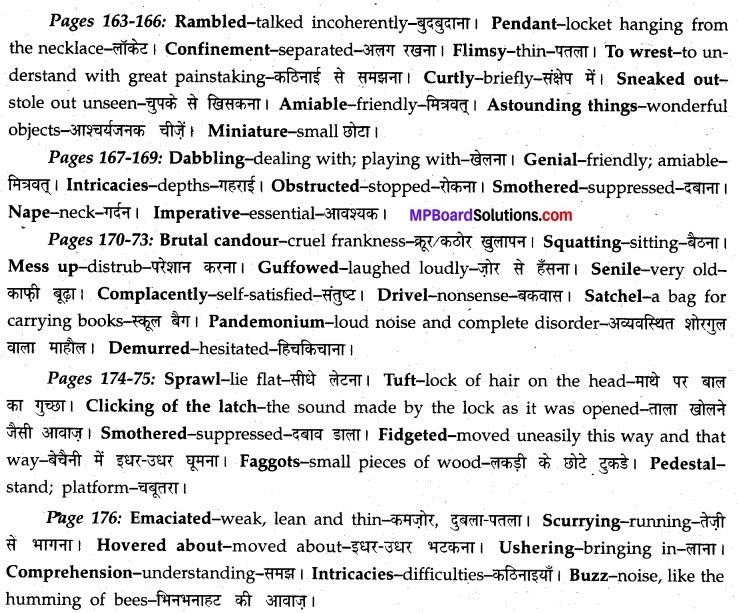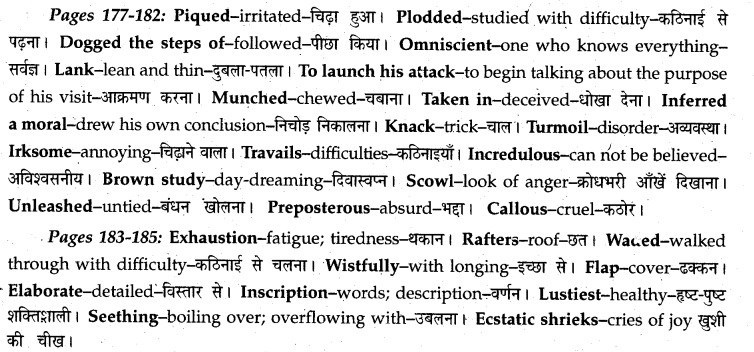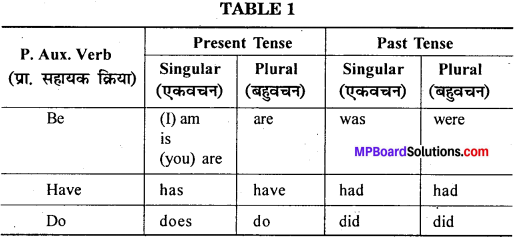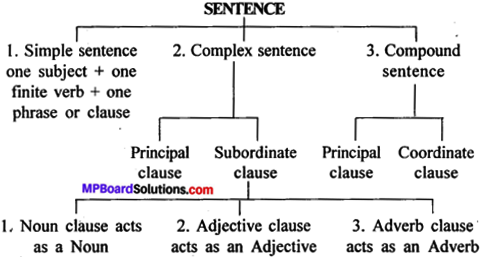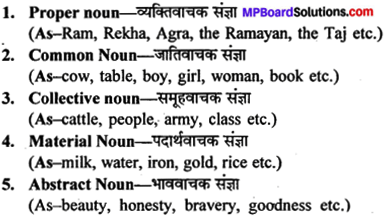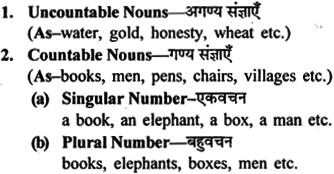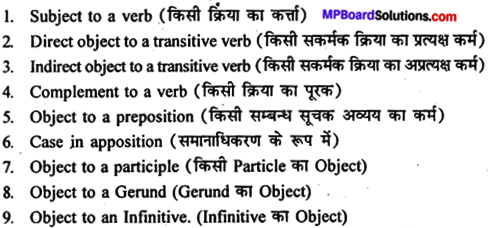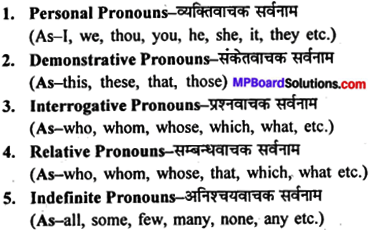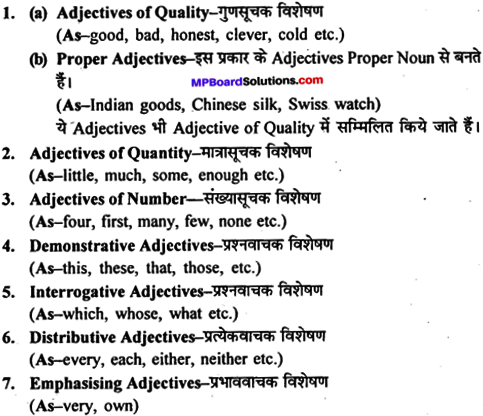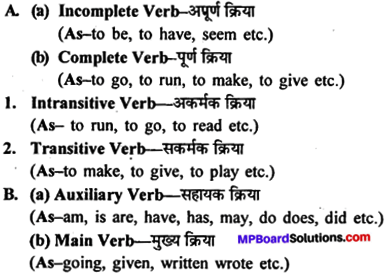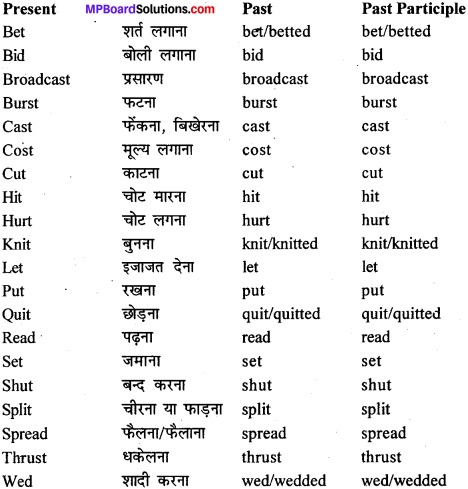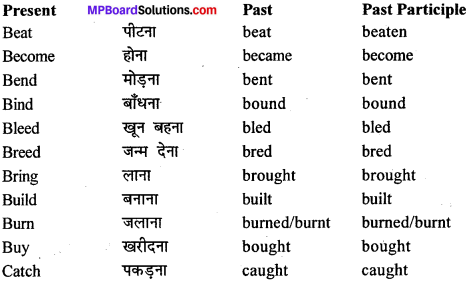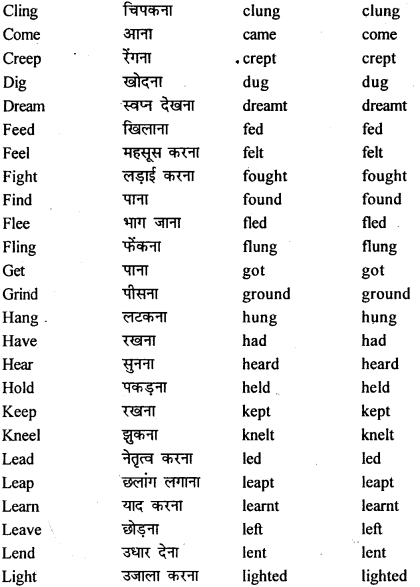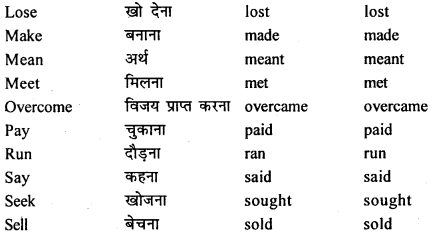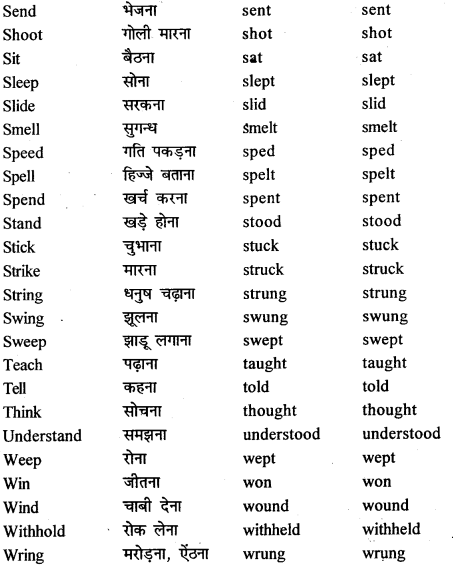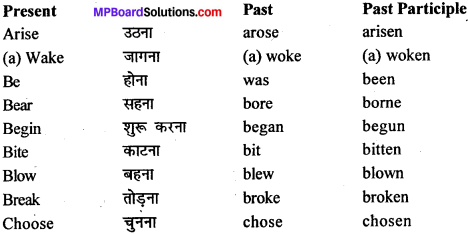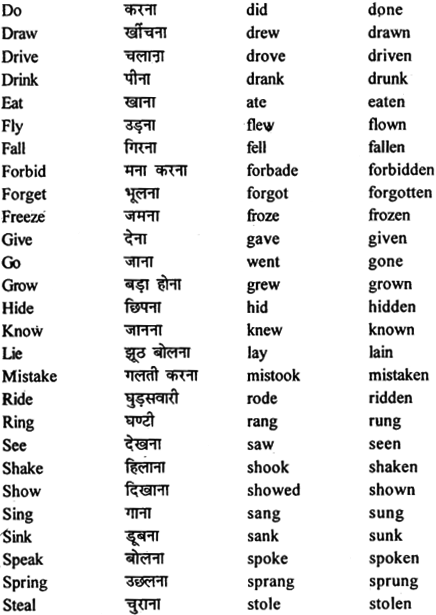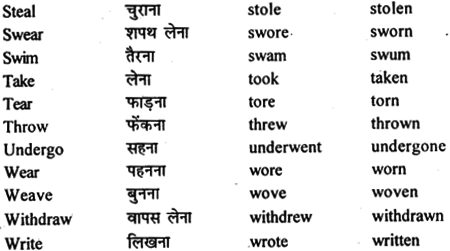MP Board Class 12th Economics Important Questions Unit 1 व्यष्टि अर्थशास्त्र परिचय
व्यष्टि अर्थशास्त्र परिचय Important Questions
व्यष्टि अर्थशास्त्र परिचय वस्तुनिष्ठ प्रश्न
व्यष्टि अर्थशास्त्र एक परिचय प्रश्न 1.
सही विकल्प चुनकर लिखिए
प्रश्न (a)
भारतीय अर्थव्यवस्था है –
(a) केन्द्रीकृत योजनाबद्ध अर्थव्यवस्था
(b) बाजार अर्थव्यवस्था
(c) मिश्रित अर्थव्यवस्था
(d) इनमें से कोई नहीं।
उत्तर:
(c) मिश्रित अर्थव्यवस्था
प्रश्न (b)
सबसे पहले ‘माइक्रो’ शब्द का प्रयोग करने वाले अर्थशास्त्री हैं –
(a) मार्शल
(b) बोल्डिंग
(c) कीन्स
(d) रेग्नर फिश
उत्तर:
(d) रेग्नर फिश
प्रश्न (c)
किसने कहा अर्थशास्त्र, धन का विज्ञान है –
(a) प्रो. रॉबिन्स ने
(b) प्रो. जे. के मेहता ने
(c) प्रो. मार्शल ने
(d) प्रो. एडम स्मिथ ने
उत्तर:
(d) प्रो. एडम स्मिथ ने
प्रश्न (d)
उत्पादन सम्भावना वक्र का आकार कैसा होता है –
(a) मूल बिन्दु की ओर अवनतोदर
(b) नतोदर
(c) सीधी रेखा
(d) इनमें से कोई नहीं
उत्तर:
(a) मूल बिन्दु की ओर अवनतोदर
प्रश्न (e)
उत्पादन संभावना वक्र के अवनतोदर आकार का कारण है –
(a) बढ़ती अवसर लागत
(b) घटती अवसर लागत
(c) समान अवसर लागत
(d) ऋणात्मक अवसर लागत
उत्तर:
(b) घटती अवसर लागत
प्रश्न (f)
संसाधनों के पूर्ण उपयोग वाला बिन्दु उत्पादन संभावना वक्र के किस ओर पाया जाता है –
(a) बायीं ओर
(b) दायीं ओर
(c) अन्दर की ओर
(d) ऊपर
उत्तर:
(d) ऊपर
व्यष्टि अर्थशास्त्र प्रश्न 2.
रिक्त स्थानों की पूर्ति कीजिए –
- प्रत्येक व्यक्ति के पास …………………………… वस्तुओं की कुछ ही मात्रा होती है।
- ………………………. में व्यक्तिगत आर्थिक इकाइयों के व्यवहार का अध्ययन किया जाता है।
- अवसर लागत उत्पादन सूची में ……………. को स्पष्ट करती हैं।
- व्यष्टि तथा समष्टि अर्थशास्त्र दोनों एक दूसरे के …………….. हैं।
- आर्थिक वृद्धि का संबंध …………….. अर्थशास्त्र से होता है।
- अर्थव्यवस्था …………….. इकाइयों का समूह होती है।
- मिश्रित अर्थव्यवस्था …………….. और …………….. को मिलाकर बनती है।
- उत्पादित वे वस्तुएँ अथवा सेवाएँ जो अन्य वस्तुओं अथवा सेवाओं के उत्पादन में काम आती हैं …………….. वस्तु कहलाती हैं।
उत्तर:
- कुछ
- व्यष्टि अर्थशास्त्र
- परिवर्तनों
- पूरक
- समष्टि
- उत्पादन
- समाजवाद, पूँजीवाद
- मध्यवर्ती.
समष्टि अर्थशास्त्र के दोष प्रश्न 3.
सत्य/असत्य का चयन कीजिए –
- उत्पादन सम्भावना वक्र मूल बिन्दु की ओर उन्नतोदर होता है?
- कीमत – यंत्र पूँजीवादी अर्थव्यवस्था में केन्द्रीय समस्याओं को हल करता है?
- अर्थव्यवस्था पूँजीवादी, समाजवादी या अवसरवादी हो सकती है?
- आजकल विश्व की सभी अर्थव्यवस्थाएँ लगभग मिश्रित अर्थव्यवस्थाएँ हैं?
- आदर्शात्मक अर्थशास्त्र में यह अध्ययन किया जाता है कि किसी तंत्र को किस प्रकार से कार्य करना चाहिए?
- समष्टि अर्थशास्त्र में बेरोजगारी, मुद्रास्फीति आदि समस्याओं का अध्ययन किया जाता है?
- समाजवाद में निजी लाभ की भावना प्रमुख है?
उत्तर:
- असत्य
- सत्य
- असत्य
- सत्य
- सत्य
- सत्य
- असत्य
एमपी बोर्ड अर्थशास्त्र प्रश्न 4.
सही जोड़ी बनाइएखण्ड –

- (c)
- (d)
- (a)
- (e)
- (b).
प्रश्न 5.
एक शब्द/वाक्य में उत्तर दीजिए –
- भारत में किस अर्थव्यवस्था को अपनाया गया है?
- उत्पादन संभावना वक्र मूल बिन्दु की ओर कैसा होता है?
- शोषण का सरकारीकरण किस अर्थव्यवस्था का दोष है?
- चुनावों की सूची बनाने वाला वक्र कौन – सा है?
- वर्ग संघर्ष किस अर्थव्यवस्था की विशेषता है?
- किस अर्थव्यवस्था में निजी क्षेत्र को सीमित कर दिया जाता है?
- पूँजीवाद की सभी संस्थाओं का हृदय किसे कहा जाता है?
- अर्थव्यवस्था की केन्द्रीय समस्याएँ क्या कहलाती हैं?
- प्राथमिकताओं के आधार पर उत्पादन क्षेत्र एवं उत्पादन की मात्रा का निर्धारण कौन करता है?
उत्तर:
- मिश्रित अर्थव्यवस्था
- नतोदर
- समाजवाद
- उत्पादन संभावना वक्र
- पूँजीवाद
- समाजवादी
- लाभ को
- आधारभूत कार्य
- केन्द्रीय नियोजन सत्ता.
व्यष्टि अर्थशास्त्र परिचय लघु उत्तरीय प्रश्न
प्रश्न 1.
समष्टि अर्थशास्त्र से क्या आशय है? इसकी दो विशेषताएँ लिखिए?
उत्तर:
समष्टि अर्थशास्त्र से आशय:
समष्टि अर्थशास्त्र, आर्थिक ज्ञान की वह शाखा है, जो संपूर्ण अर्थव्यवस्था एवं अर्थव्यवस्था से संबंधित बड़े योगों व औसतों का, उनके व्यवहार एवं पारस्परिक संबंधों का अध्ययन करती है। समष्टि अर्थशास्त्र की विशेषताएँ – समष्टि अर्थशास्त्र की निम्नलिखित दो विशेषताएँ हैं –
1. समष्टि अर्थशास्त्र की धारणा विस्तृत:
समष्टि अर्थशास्त्र की धारणा विस्तृत है। इसमें छोटी इकाइयों को महत्व नहीं दिया जाता, बल्कि इसकी सहायता से राष्ट्रीय एवं अंतर्राष्ट्रीय समस्या का हल निकाला जाता है। अतः समष्टि अर्थशास्त्र प्रावैगिक अर्थव्यवस्था को महत्व देता है।
2. विस्तृत विश्लेषण:
समष्टि अर्थशास्त्र में विस्तृत विश्लेषण को सर्वाधिक महत्व दिया जाता है। उदाहरण के लिए, समष्टि अर्थशास्त्र में सरकार की मौद्रिक एवं राजस्व की नीतियों का अध्ययन किया जाता है जो कि सामान्य प्रभावों को स्पष्ट करता है तथा इस तथ्य को नजर अंदाज कर दिया जाता है कि इन नीतियों का व्यक्तियों अथवा उद्योगों पर क्या प्रभाव पड़ेगा? यदि सार्वजनिक आय तथा सार्वजनिक व्यय का परस्पर प्रभाव समाज पर अच्छा पड़ रहा है, तो निष्कर्ष के रूप में यह कहा जा सकता है कि समाज में रहने वाले व्यक्ति पर इसका अच्छा प्रभाव पड़ेगा।
प्रश्न 2.
समष्टि अर्थशास्त्र के प्रकारों को स्पष्ट कीजिए?
उत्तर:
समष्टि अर्थशास्त्र के प्रमुख प्रकार निम्नलिखित हैं –
1. समष्टि आर्थिक स्थैतिकी:
समष्टि अर्थशास्त्र के अंतर्गत संपूर्ण अर्थव्यवस्था का अध्ययन किया जाता है; लेकिन समष्टि आर्थिक विश्लेषण इस तथ्य का विश्लेषण नहीं करता कि अर्थव्यवस्था संतुलन के बिन्दु पर किस प्रकार पहुँचती है। समष्टि स्थैतिक में जिस अंतिम संतुलन का अध्ययन किया जाता है, उसे प्रो. कीन्स के अनुसार, निम्नलिखित समीकरण की सहायता से स्पष्ट किया जा सकता है Y = C + I यहाँ, Y = कुल आय, C = कुल उपभोग व्यय एवं I = कुल विनियोग व्यय है।
2. तुलनात्मक समष्टि आर्थिक स्थैतिकी:
इसके अंतर्गत स्थैतिकी रीति द्वारा प्रावैगिक प्रक्रिया का अध्ययन किया जाता है। एक अर्थव्यवस्था के विभिन्न ‘समष्टि चर’ जैसे – कुल आय एवं कुल रोजगार आदि परिवर्तित होते रहते हैं। इसके परिणामस्वरूप अर्थव्यवस्था के साम्य बिन्दु भी परिवर्तित होते रहते हैं।
3. समष्टि आर्थिक प्रावैगिकी:
आर्थिक विश्लेषण की यह नवीनतम प्रणाली है। इसके अंतर्गत एक साम्य से दूसरे साम्य तक पहुँचने की संपूर्ण प्रक्रिया का अध्ययन किया जाता है। हालाँकि उच्च गणितीय प्रयोग के कारण यह जटिल प्रणाली है, किन्तु यह संपूर्ण अर्थव्यवस्था के प्रावैगिक चित्र को यथार्थ रूप में प्रस्तुत करती है।
प्रश्न 3.
आर्थिक समस्या क्या है? यह क्यों उत्पन्न होती है?
उत्तर:
अर्थव्यवस्था की आर्थिक समस्याओं का संबंध आबंटन की समस्या से है। साधन सीमित हैं एवं आवश्यकताएँ असीमित, यही कारण है कि दुर्लभ संसाधनों के उपयोगों में चुनाव की समस्या जन्म लेती है जिसमें साधनों के वैकल्पिक उपयोग से संसाधनों का कुशलतम एवं अधिकतम उपयोग किया जा सके आर्थिक समस्याएँ इसलिए उत्पन्न होती हैं क्योंकि प्रो. रॉबिन्स के अनुसार, मानव की इच्छाएँ एवं आवश्यकताएँ अनंत एवं असीमित होती हैं।
सभी आवश्यकताएँ पूर्ण हो जायें यह भी संभव नहीं होता है। इन आवश्यकताओं की पूर्ति के साधन अर्थात् धन सीमित होता है। इसीलिए साधनों के वैकल्पिक उपयोग किए जाते हैं ताकि इनका कुशलतम उपयोग किया जा सके। अतएव दुर्लभ साधनों का कुशलतम एवं सर्वोत्तम उपयोग करना आवश्यक है क्योंकि संसाधनों की दुर्लभता आर्थिक समस्या को जन्म देती है।
प्रश्न 4.
‘दुर्लभता ही केन्द्रीय समस्याओं की जननी है’, स्पष्ट कीजिए?
उत्तर:
यह कथन अक्षरशः
सही है कि साधनों की दुर्लभता है परन्तु इन दुर्लभ साधनों में से किनका चयन किया जाए यह समस्या जन्म लेती है। दुर्लभता ही चयन की समस्या का मूल कारण है। ये संसाधन दुर्लभ हैं परन्तु इनका वैकल्पिक उपयोग किया जा सकता है। इन संसाधनों से अधिकतम संतुष्टि प्राप्त करने के लिए व्यक्ति एवं समाज को संसाधनों के प्रयोग का चयन करना पड़ता है। इसीलिए ऐसा कहा जाता है कि दुर्लभता ही केन्द्रीय समस्याओं की जननी है।
प्रश्न 5.
सकारात्मक आर्थिक विश्लेषण क्या है? समझाइये?
उत्तर:
इस आर्थिक विश्लेषण के अन्तर्गत यह देखा जाता है कि मूल्य एवं माँग के सिद्धान्त के व्यवहार में क्रियाशीलता दिखाई दे रही है या नहीं अर्थात् मूल्य के बढ़ने से माँग की मात्रा कम हो रही है या नहीं तथा मूल्य के घटने से माँग की मात्रा में वृद्धि होती है या नहीं। यही सकारात्मक आर्थिक विश्लेषण कहलाता है।
प्रश्न 6.
आदर्शात्मक आर्थिक विश्लेषण से आप क्या समझते हैं?
उत्तर:
इस आर्थिक विश्लेषण में यह देखा जाता है कि जिन विधियों एवं तकनीकों का प्रयोग किया जाता है उसका प्रभाव समाज या अर्थव्यवस्था पर अच्छा पड़ रहा है या बुरा । उदाहरण के लिए, मादक पदार्थों की माँग को समाज हित में कम करने के लिए इन वस्तुओं पर करारोपण अधिक किया जा सकता है। आदर्शात्मक आर्थिक विश्लेषण सत्य – असत्य, उचित – अनुचित पर आधारित होता है।
प्रश्न 7.
उत्पादन संभावना वक्र की मान्यताएँ लिखिए?
उत्तर:
उत्पादन संभावना वक्र की प्रमुख मान्यताएँ निम्न प्रकार है –
- अर्थव्यवस्था में उपलब्ध संसाधनों की मात्रा निश्चित होती है।
- संसाधनों का पूर्ण एवं कुशलतम प्रयोग आवश्यक है।
- उत्पादन की तकनीक अर्थव्यवस्था में दी हुई होती है।
- अर्थव्यवस्था में केवल दो वस्तुओं का ही उत्पादन हो रहा है ऐसा यह नियम मानता है।
- उपलब्ध संसाधनों की कुशलता सभी वस्तुओं के उत्पादन में एक समान नहीं होती है।
प्रश्न 8.
अर्थव्यवस्था की उत्पादन संभावनाओं से आपका क्या अभिप्राय है?
उत्तर:
किसी अर्थव्यवस्था में आवश्यकता के अनुरूप एवं उपलब्ध संसाधनों के आधार पर संयोगों को निर्धारित करना होता है। जिन दो वस्तुओं के संयोग को चुना जाता है वही अर्थव्यवस्था के उत्पादन की संभावनाएँ कहलाती हैं। यह उत्पादन संभावना वक्र से निर्धारित की जाती है।
प्रश्न 9.
सीमान्त उत्पादन संभावना किसे कहते हैं?
उत्तर:
सीमान्त उत्पादन संभावना से अभिप्राय उस लागत से है जो एक अतिरिक्त इकाई उत्पादित करने की अवसर लागत है। अंतिम वस्तु की लागत की संभावना सीमान्त कहलाती है।
प्रश्न 10.
किसी विद्यालय में कार्यरत् शिक्षक विश्वविद्यालय से डॉक्टर ऑफ फिलॉसफी की उपाधि प्राप्त करने के लिए दो वर्षों के अध्ययन अवकाश पर जाता है। उस शिक्षक की मासिक आय ₹35,200 है। शोध उपाधि शुल्क ₹40,000 है। उस शिक्षक की डॉक्टरेट डिग्री प्राप्त करने की अवसर लागत क्या होगी?
उत्तर:
अवसर लागत = (35,200 x 12 x 2) + 40,000 = (35,200 x 24) + 40,000 = ₹ 8,84,800
प्रश्न 11.
उत्पादन संभावना वक्र नीचे की ओर ढाल क्यों होता है?
उत्तर:
किसी अर्थव्यवस्था में पूर्ण रोजगार की दशा में संसाधनों का कुशलतम उपयोग किसी एक वस्तु के उत्पादन की मात्रा को बढ़ाता है तो दूसरी वस्तु की उत्पादन मात्रा को कम करता. है। जब अर्थव्यवस्था के सभी संसाधनों का कुशलतम एवं पूर्ण उपयोग किया जा रहा हो तो दोनों वस्तुओं के उत्पादन में एक साथ वृद्धि करना संभव नहीं होता है। एक वस्तु के उत्पादन की मात्रा को घटाकर ही दूसरी वस्तु के उत्पादन में वृद्धि की जा सकती है। यही कारण है कि उत्पादन संभावना वक्र का झुकाव बाएँ से दाहिने ओर ढाल होता है। यह इस चित्र से और अधिक स्पष्ट किया जा सकता है।
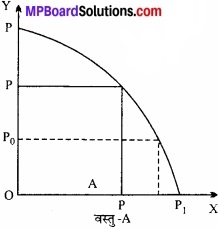
प्रश्न 12.
उत्पादन संभावना वक्र नतोदर क्यों होता है?
उत्तर:
सामान्यतया उत्पादन संभावना वक्र मूल बिन्दु के नतोदर होता है। यह स्थिति उसके ढलान बढ़ने के कारण निर्मित होती है। ढलान के बढ़ने का अर्थ है सीमांत अवसर लागत में वृद्धि। जैसे – जैसे संसाधनों को एक वस्तु के उत्पादन से दूसरे वस्तु के उत्पादन में स्थानांतरित किया जाता है। इसकी वजह से Y वस्तु के उत्पादन को हानि के रूप में X वस्तु की प्रत्येक अतिरिक्त इकाई के उत्पादन की अवसर लागत में वृद्धि की प्रवृत्ति होती है। ऐसा इस कारण होता है कि संसाधनों का प्रयोग विशिष्ट तौर पर ही किया जा सकता है।
उदाहरण के लिए, यदि किसी राज्य में आम की उत्पादकता अधिक होती है तो जरूरी नहीं कि किसी अन्य राज्य में भी आम की खेती अधिक हो। हो सकता है दूसरे राज्य में Y, गन्ने की खेती एवं उसका उत्पादन अधिक हो। अत: यह आवश्यक नहीं है कि जो AY व्यक्ति चावल उत्पादन में सक्षम हो वह व्यक्ति मशीन उत्पादन में भी निपुण होगा।
चित्र से स्पष्ट हो रहा है कि प्रत्येक स्तर पर सीमांत अवसर लागत या बढ़ती रूपांतरण की सीमांत दर अर्थात् \(\frac { \triangle Y }{ \triangle X } \) लगातार बढ़ रही है। यही कारण है कि बढ़ती हुई सीमांत अवसर लागत की वजह से उत्पादन संभावना वक्र मूल बिन्दु के नतोदर होता है।
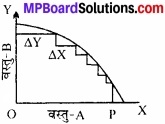
प्रश्न 13.
अर्थशास्त्र में किस वस्तु का अध्ययन किया जाता है?
उत्तर:
किसी अर्थव्यवस्था में विषय-वस्तु क्या हो यह अत्यंत महत्वपूर्ण प्रश्न है। वास्तव में यह विषयवस्तु इतनी अधिक व्यापक होती है कि अर्थव्यवस्था को यह निर्णय करना होता है कि उपलब्ध संसाधनों का अधिकतम एवं कुशलतम उपयोग हो। दुर्लभ संसाधनों का विवेकपूर्ण उपयोग पर आधारित होता है किसी अर्थव्यवस्था का अध्ययन। किसी भी अर्थव्यवस्था का अंतिम लक्ष्य अधिकतम आर्थिक कल्याण होता है। किसी भी अर्थव्यवस्था में जिन आर्थिक प्रणालियों के द्वारा अध्ययन किया जाता है वे व्यष्टि एवं समष्टि पर आधारित होती हैं।
व्यष्टि अर्थशास्त्र के अंतर्गत उपभोक्ता सिद्धान्त, उत्पादक व्यवहार सिद्धान्त, कीमत निर्धारण, कल्याणकारी अर्थशास्त्र तथा समष्टि अर्थशास्त्र के अंतर्गत राष्ट्रीय आय तथा रोजगार, राजकोषीय और मौद्रिक नीतियाँ, मुद्रास्फीति एवं अपस्फीति, सरकारी बजट, विनिमय दर एवं भुगतान संतुलन का अध्ययन किया जाता है।
व्यष्टि अर्थशास्त्र परिचय दीर्घ उत्तरीय प्रश्न
प्रश्न 1.
व्यष्टि एवं समष्टि अर्थशास्त्र में अंतर स्पष्ट कीजिए?
उत्तर:
व्यष्टि एवं समष्टि अर्थशास्त्र में अंतर:
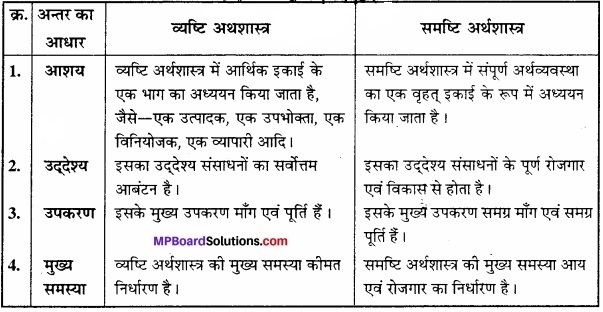
प्रश्न 2.
व्यष्टि अर्थशास्त्र का अर्थ बताते हुए इसकी विशेषताएँ लिखिए?
उत्तर:
व्यष्टि अर्थशास्त्र का अर्थ:
व्यष्टि अर्थशास्त्र अंग्रेजी भाषा के शब्द ‘माइक्रो’ (micro), ग्रीक भाषा के शब्द ‘माइक्रोस’ (micros) का हिन्दी रूपान्तरण है। व्यष्टि से अभिप्राय है – अत्यंत छोटी इकाई, दस लाखवाँ भाग, अर्थात व्यष्टि अर्थशास्त्र का संबंध अध्ययन की सबसे छोटी इकाई से है।
इस प्रकार, व्यष्टि अर्थशास्त्र के अंतर्गत वैयक्तिक इकाइयों जैसे – व्यक्ति, परिवार, उत्पादक फर्म उद्योग आदि का अध्ययन किया जाता है। प्रो. चेम्बरलिन के अनुसार, “व्यष्टि अर्थशास्त्र पूर्णरूप से व्यक्तिगत व्याख्या पर आधारित है और इसका संबंध अंतर – वैयक्तिक संबंधों से भी होता है।” व्यष्टि अर्थशास्त्र की विशेषताएँ:
व्यष्टि अर्थशास्त्र की निम्नलिखित विशेषताएँ हैं –
1. वैयक्तिक इकाइयों का अध्ययन:
व्यष्टि अर्थशास्त्र में वैयक्तिक इकाइयों का ही अध्ययन किया जाता है। व्यष्टि अर्थशास्त्र वैयक्तिक आय, वैयक्तिक उत्पादन एवं वैयक्तिक उपभोग आदि की व्याख्या करने में सहायता करता है। यह प्रणाली अपना संबंध समूहों से न रखकर इकाइयों से रखती है। इस प्रकार व्यष्टि अर्थशास्त्र वैयक्तिक समस्याओं का अध्ययन करते हुए समस्त अर्थव्यवस्था के विश्लेषण में सहायता प्रदान करता है।
2. सूक्ष्म चरों का अध्ययन:
सूक्ष्म अर्थशास्त्र की दूसरी विशेषता के रूप में यह छोटे – छोटे चरों का अध्ययन करती है। इसके चरों का प्रभाव इतना कम है कि इसके परिवर्तनों का प्रभाव संपूर्ण अर्थव्यवस्था पर नहीं पड़ता है। उदाहरण के लिए – एक उपभोक्ता अपने उपभोग, एक उत्पादक अपने उत्पादन से संपूर्ण अर्थव्यवस्था की माँग पूर्ति को प्रभावित नहीं कर सकता है।
3. व्यक्तिगत मूल्य का निर्धारण:
व्यष्टि अर्थशास्त्र को कीमत सिद्धांत अथवा मूल्य सिद्धांत के नाम से भी जाना जाता है। इसके अंतर्गत वस्तु की माँग एवं पूर्ति की घटनाओं का अध्ययन किया जाता है। इसके साथ-साथ माँग एवं पूर्ति के द्वारा विभिन्न वस्तुओं के व्यक्तिगत मूल्य – निर्धारण भी किये जाते हैं।
4. पूर्ण रोजगार की मान्यता पर आधारित:
व्यष्टि अर्थशास्त्र पूर्ण रोजगार की मान्यता को लेकर चलता है।
प्रश्न 3.
सूक्ष्म अर्थशास्त्र (व्यष्टि अर्थशास्त्र) के पाँच महत्व बताइए?
उत्तर:
सूक्ष्म अर्थशास्त्र के महत्व निम्नलिखित हैं –
1. संपूर्ण अर्थव्यवस्था के लिए आवश्यक:
यदि हम संपूर्ण अर्थव्यवस्था के स्वरूप की जानकारी प्राप्त करना चाहते हैं तो हमें व्यक्तिगत इकाइयों की जानकारी हासिल करना आवश्यक है, क्योंकि व्यक्तिगत माँग, व्यक्तिगत उत्पादन के संयोग से ही सामूहिक माँग और सामूहिक पूर्ति से संबंधित जानकारी हासिल की जा सकती है।
जैसे कि सूती वस्त्र उद्योग की क्या स्थिति है, इससे संबंधित जानकारी ज्ञात करनी है तो हमें सबसे पहले सूती वस्त्र की फर्मों की जानकारी हासिल करनी होगी तभी हमें सती वस्त्र उद्योग की स्थिति के बारे में जानकारी मिलेगी। इस प्रकार व्यष्टि अर्थशास्त्र की सहायता से समष्टि अर्थशास्त्र की समस्याओं का अध्ययन किया जाता है।
2. आर्थिक समस्याओं के निर्णय में सहायक:
व्यष्टि अर्थशास्त्र आर्थिक समस्याओं के निर्णय में सहायक होता है। आर्थिक समस्याओं में मूल्य निर्धारण एवं वितरण की समस्या प्रमुख होती है। उत्पत्ति का प्रत्येक साधन अधिकाधिक पारिश्रमिक प्राप्त करना चाहता है। इसी तरह वस्तु के मूल्य निर्धारण की समस्या भी है। इन समस्त समस्याओं के निर्णय के लिए व्यष्टि अर्थशास्त्र उपयोगी रहा है।
3. आर्थिक नीति के निर्धारण में सहायक:
व्यष्टि अर्थशास्त्र का आर्थिक नीतियों के निर्धारण में महत्वपूर्ण स्थान है। व्यष्टि अर्थशास्त्र के अंतर्गत सरकार की आर्थिक नीतियों का अध्ययन इस आधार पर किया जाता है, कि उनका व्यक्तिगत इकाइयों के कार्यकरण पर कैसा प्रभाव पड़ता है।
4. आर्थिक कल्याण की पूर्ति का निरीक्षण:
व्यष्टि अर्थशास्त्र में जहाँ व्यक्तिगत उपभोग, व्यक्तिगत रहन-सहन के स्तर की जानकारी प्राप्त की जाती है, वहीं सार्वजनिक व्यय एवं सार्वजनिक आय के प्रभावों की भी जानकारी प्राप्त की जाती है।
5. व्यक्तिगत इकाइयों के आर्थिक निर्णय में सहायक:
व्यष्टि अर्थशास्त्र, व्यक्तिगत इकाइयों (जैसेफर्म, परिवार, व्यक्तिगत आय, व्यक्तिगत बचत आदि) की समस्याओं पर उचित निर्णय लेने में सहायता प्रदान करता है।
प्रश्न 4.
व्यापक अर्थशास्त्र की क्या सीमाएँ हैं? अथवा समष्टि अर्थशास्त्र के दोष लिखिए?
उत्तर:
समष्टि अर्थशास्त्र की सीमाएँ या दोष निम्नानुसार हैं –
1. समूह की संरचना को महत्व न देना:
समष्टि अर्थशास्त्र के अन्तर्गत, समूह के आकार – प्रकार का ही अध्ययन किया जाता है, न कि समूह की संरचना का। अत: समूह के आधार पर भविष्यवाणियाँ करना अथवा सुझाव देना, तब तक सही नहीं है जब तक समूह की बनावट एवं उसके अंगों के स्वभाव तथा परस्पर सम्बन्ध की समस्त जानकारी हासिल न कर ली जाये।
2. वैयक्तिक इकाई महत्वहीन:
समष्टि अर्थशास्त्र के अन्तर्गत, वैयक्तिक इकाइयों की तलना में सम्पूर्ण अर्थव्यवस्था का अध्ययन किया जाता है लेकिन ऐसा करने से एक दोष उत्पन्न हो जाता है कि जिन छोटी-छोटी आर्थिक इकाइयों के योग से सम्पूर्ण अर्थव्यवस्था की दीवार खड़ी की गयी है, उनके महत्व एवं अस्तित्व की उपेक्षा कर दी जाती है जो सर्वथा अनुचित है।
3. निष्कर्षों का व्यावहारिक न होना:
समष्टि अर्थशास्त्र में सम्पूर्ण मात्राओं का अध्ययन किया जाता है, लेकिन समूह के आर्थिक विश्लेषण के आधार पर निर्मित नीतियाँ कभी – कभी गलत परिणाम दे देती हैं।
4. समूह की इकाइयाँ, वैयक्तिक इकाइयों का सही प्रतिनिधित्व नहीं कर सकती हैं:
समष्टि अर्थशास्त्र की अंतिम सीमा यह है कि समूह की इकाइयाँ वैयक्तिक इकाइयों का सही प्रतिनिधित्व नहीं कर सकती हैं।
5. जटिल विश्लेषण:
सैद्धांतिक दृष्टिकोण से समष्टि आर्थिक विश्लेषण सरल लगता है किन्तु व्यावहारिक दृष्टिकोण से यह विश्लेषण बहुत जटिल होता है। सम्पूर्ण अर्थव्यवस्था के समूहों अथवा योगों का अध्ययन एवं विश्लेषण बहुत जटिल कार्य होता है।
प्रश्न 5.
समष्टि अर्थशास्त्र के महत्व के कोई पाँच बिन्दु स्पष्ट कीजिए?
अथवा
समष्टि अर्थशास्त्र के कोई पाँच गुण लिखिए?
उत्तर:
समष्टि अर्थशास्त्र के महत्व या गुण निम्नानुसार हैं –
1. जटिल समस्याओं के अध्ययन में सहायक:
आधुनिक अर्थव्यवस्था अत्यन्त जटिल है। अनेक आर्थिक तत्व एक-दूसरे पर आश्रित रहते हैं। समष्टि अर्थशास्त्र के विश्लेषण की सहायता से पूर्ण रोजगार, व्यापार चक्र आदि जटिल समस्याओं का अध्ययन हो जाता है।
2. आर्थिक नीतियों के निर्माण में सहायक:
सरकार का प्रमुख कार्य कुल रोजगार, कुल आय, कीमत स्तर, व्यापार के सामान्य स्तर आदि पर नियंत्रण करना होता है। समष्टि अर्थशास्त्र सरकार को आर्थिक नीतियों के निर्माण में सहायता पहँचाता है।
3. व्यष्टि अर्थशास्त्र के अध्ययन में सहायक:
समष्टि अर्थशास्त्र का अध्ययन व्यष्टि अर्थशास्त्र के अध्ययन में सहायक है क्योंकि व्यक्तिगत इकाइयाँ अपने विश्लेषण में समष्टि अर्थशास्त्र की सहायता लेती हैं।
4. आर्थिक विकास का अध्ययन:
समष्टि अर्थशास्त्र के अन्तर्गत अर्थव्यवस्था के आर्थिक विकास के संसाधनों एवं क्षमताओं का मूल्यांकन किया जाता है। राष्ट्रीय आय उत्पादन एवं रोजगार के स्तर में वृद्धि करने के लिए योजनाएँ बनायी तथा कार्यान्वित की जाती हैं ताकि अर्थव्यवस्था का बहुमुखी विकास हो सके।
5. मुद्रा – मूल्य के निर्धारण में सहायक:
मुद्रा के मूल्य निर्धारण के सिद्धान्त की व्याख्या समष्टि अर्थशास्त्र में ही की जाती है क्योंकि इसमें मुद्रा – मूल्य के परिवर्तनों के सम्पूर्ण समाज पर पड़ने वाले प्रभावों की व्याख्या की जाती है।
प्रश्न 6.
व्यष्टि अर्थशास्त्र की कोई पाँच सीमाएँ लिखिए?
अथवा
व्यष्टि अर्थशास्त्र के पाँच दोष लिखिए?
उत्तर:
व्यष्टि अर्थशास्त्र की सीमाएँ या दोष निम्नानुसार हैं –
1. केवल व्यक्तिगत इकाइयों का अध्ययन:
व्यष्टि अर्थशास्त्र में केवल व्यक्तिगत इकाइयों का ही अध्ययन किया जाता है। इस विश्लेषण में राष्ट्रीय अथवा विश्वव्यापी अर्थव्यवस्था का सही – सही ज्ञान प्राप्त नहीं हो पाता।
2. अवास्तविक मान्यताएँ:
व्यष्टि अर्थशास्त्र अवास्तविक मान्यताओं जैसे – पूर्ण रोजगार, पूर्ण प्रतियोगिता व दीर्घकाल पर आधारित है। इसलिए काल्पनिक भी कहा जाता है।
3. व्यष्टि निष्कर्ष समग्र अर्थव्यवस्था के लिए अनुपयुक्त:
व्यष्टि अर्थशास्त्र व्यक्तिगत इकाइयों के अध्ययन के आधार पर निर्णय लेता है, लेकिन व्यवहार में कुछ धारणाएँ ऐसी होती हैं जिन्हें समूहों पर लागू करने से गलत निष्कर्ष निकलता है।
4. संकुचित अध्ययन:
कुछ आर्थिक समस्याएँ ऐसी होती हैं जिसका अध्ययन व्यष्टि अर्थशास्त्र में नहीं हो सकता है, जैसे – मौद्रिक नीति, राष्ट्रीय आय, रोजगार, राजकीय नीति, विदेशी विनिमय आदि।
5. अव्यावहारिक:
व्यष्टि अर्थशास्त्र के अधिकांश नियम एवं सिद्धान्त पूर्ण रोजगार की मान्यता पर आधारित है, लेकिन जब पूर्ण रोजगार की मान्यता ही अव्यावहारिक है, तो इस पर बने समस्त नियम एवं सिद्धान्त भी अव्यावहारिक ही कहे जायेंगे।
प्रश्न 7.
अवसर लागत क्या है? उदाहरण सहित समझाइये?
उत्तर:
अवसर लागत दो अवसरों में दूसरे अवसर की हानि के रूप में पहले अवसर का लाभ उठाने की लागत है। अवसर लागत वास्तव में किसी साधन के उसके दूसरे सर्वश्रेष्ठ प्रयोग मूल्य को कहा जाता है। उदाहरण के लिए, एक ड्राइवर ट्रक भी चला सकता है एवं कार भी चला सकता है। इनमें से वर्तमान ट्रक ड्राइवर को बनाए रखने के लिए यदि वह कार ड्राइवरी की नौकरी का परित्याग करता है तो इसे अवसर लागत कहते हैं। वास्तव में अवसर लागत, साधन लागत के ऊपर एक बचत है।
एक अन्य उदाहरण के अनुसार, हाई स्कूल परीक्षा पास करने के बाद कक्षा 11वीं में विषय चयन के समय वाणिज्य विषय को चुनता है तो विज्ञान तथा कला विषयों का उसे त्याग करना पड़ेगा। यहाँ पर विज्ञान तथा कला विषय, वाणिज्य विषय चुनने की अवसर लागत है।
एक अन्य उदाहरणानुसार, एक उच्च शिक्षित व्यक्ति एम.कॉम. उत्तीर्ण करने के बाद शिक्षक बनकर ₹ 50,000, पुस्तकों का लेखन कार्य करके ₹ 60,000 एवं अर्थशास्त्री बनकर ₹ 80,000 अर्जित कर सकता है। यदि वह अर्थशास्त्री बनना चाहता है तो उसे शिक्षक बनने के अवसर का परित्याग करना पड़ेगा। उसकी अवसर लागत ₹ 60,000 है क्योंकि यही दूसरा सर्वश्रेष्ठ विकल्प उसके पास उपलब्ध है। उदाहरण के लिए, विद्यार्थी का C.A. के लिए बी.कॉम. छोड़ना।
प्रश्न 8.
उत्पादन संभावना वक्र क्या है? एक उदाहरण देकर समझाइए?
उत्तर:
दो वस्तुओं के उन सभी संभव संयोगों को जिनका उपयोग किसी अर्थव्यवस्था में उपलब्ध तकनीक एवं संसाधनों के पूर्ण एवं कुशलतम उपयोग पर निर्भर करता है, उत्पादन संभावना वक्र कहलाता है। उदाहरणसीमित संसाधनों एवं उपलब्ध तकनीकों के आधार पर काल्पनिक उदाहरण द्वारा उत्पादन संभावना को प्रदर्शित किया जा सकता है।

संसाधनों की सीमितता के कारण अर्थव्यवस्था में संसाधनों का पूर्ण उपयोग तभी संभव है जब एक वस्तु का उत्पादन बढ़ाने के लिए दूसरी वस्तु का उत्पादन कम किया जाए। सारणी से स्पष्ट है कि यदि मशीनों का उत्पादन शून्य है तो चावल का उत्पादन 500 टन होगा।
जैसे ही मशीनों का उत्पादन 1 से बढ़कर 2 किया जाएगा। चावल का उत्पादन 500 टन से घटाकर 450 टन हो जाएगा। यदि सभी संसाधनों को मशीनों के उत्पादन पर लगा दिया जाय तो इससे मशीनों का उत्पादन तो 4 हो जाएगा किन्तु चावल का उत्पादन शून्य हो जाएगा। अत: उचित संयोग बनाकर उत्पादन किया जाता है।
प्रश्न 9.
सीमान्त अवसर लागत से आप क्या समझते हैं? एक काल्पनिक अनुसूची की सहायता से समझाइये?
उत्तर:
सीमान्त अवसर लागत का आशय X एवं Y वस्तुओं में X की प्रत्येक अतिरिक्त इकाई के लिए Y वस्तु के उत्पादन का परित्याग है। सीमान्त अवसर लागत को रूपान्तरण की सीमान्त दर भी कहा जाता है। बीजगणितीय समीकरण की सहायता से इसे निम्न प्रकार स्पष्ट किया जा सकता है –
सीमान्त अवसर लागत = \(\frac { -\triangle Y }{ \triangle X } \)
यहाँ पर,
∆Y = वस्तु के उत्पादन में वृद्धि
∆X = X वस्तु के उत्पादन में वृद्धि
उपर्युक्त को निम्न अनुसूची से अधिक स्पष्ट किया जा सकता है:

उपर्युक्त अनुसूची से स्पष्ट है कि A से B पर जाने के लिए उसे वस्तु ‘ख’ की पाँचों इकाइयों का परित्याग करके वस्तु ‘क’ की एक इकाई उत्पादित करनी पड़ रही है। इसी प्रकार B से C जाने के लिए उसे वस्तु “ख” की दस इकाइयों का परित्याग करके “क” वस्तु की एक इकाई का उत्पादन करना पड़ेगा। संयोग E के पश्चात Fतक पहुँचने के लिए यह दर 25:0 हो गई है। इससे सिद्ध होता है कि उत्पादन संभावना वक्र को रूपांतरण वक्र या सीमान्त अवसर लागत या रूपांतरण की सीमान्त दर भी कहा जा सकता है।
प्रश्न 10.
“व्यष्टि एवं समष्टि अर्थशास्त्र एक – दूसरे के प्रतियोगी नहीं बल्कि पूरक हैं।” इस कथन को तर्क देकर सिद्ध कीजिए?
उत्तर:
व्यष्टि एवं समष्टि अर्थशास्त्र एक – दूसरे के पूरक हैं, क्योंकि:
(I) समष्टि आर्थिक विश्लेषण में व्यष्टि आर्थिक विश्लेषण की आवश्यकता:
समष्टि आर्थिक विश्लेषण के लिए व्यष्टि आर्थिक विश्लेषण अतिआवश्यक है क्योंकि
1. सम्पूर्ण अर्थव्यवस्था का अध्ययन करने के लिए उसके संबंध में नीति का निर्धारण करने के लिए हमें व्यक्तिगत इकाइयों का विश्लेषण करना पड़ता है। जब तक व्यक्तिगत इकाइयों के बारे में सही – सही जानकारी प्राप्त नहीं होती है, तब तक समष्टि आर्थिक विश्लेषण सही नहीं हो सकते।
2. यदि समाज में रहने वाले लोगों द्वारा अधिकाधिक वस्तुओं की माँग की जाती है तो यह समझा जाता है कि फर्म माँग बढ़ने के कारण उत्पादन बढ़ायेगी, किन्तु जिन फर्मों की उत्पादन लागत में वृद्धि हो रही हो, उन फर्मों के लिए अधिक कीमत पर भी उत्पादन में वृद्धि करना संभव नहीं होगा।
3. सम्पूर्ण अर्थव्यवस्था की सामान्य प्रवृत्ति की सही-सही जानकारी तभी प्राप्त हो सकती है जब हमें तथ्यों एवं सिद्धान्तों का ज्ञान हो।
(II) व्यष्टि आर्थिक विश्लेषण में समष्टि आर्थिक विश्लेषण की आवश्यकता:
व्यष्टि आर्थिक विश्लेषण के लिए समष्टि आर्थिक विश्लेषण अति आवश्यक है क्योंकि:
- किसी भी फर्म को अपने उत्पादन की मात्रा निश्चित करते समय समाज की सम्पूर्ण माँग, समाज की क्रयशक्ति, रोजगार स्तर एवं आय के स्तर जैसी बातों को ध्यान में रखना पड़ता है।
- कोई फर्म कितना माल विक्रय कर सकेगी, यह इस बात पर निर्भर करेगा कि समाज में लोगों की क्रयशक्ति कितनी है।
- प्रायः एक व्यक्तिगत उत्पादन के उत्पत्ति के साधनों की मजदूरी का निर्धारण व्यष्टि अर्थशास्त्र के अन्तर्गत किया जाना चाहिए, किन्तु व्यवहार में ऐसा नहीं होता। इसके लिए अन्य संबंधित तथ्यों को अध्ययन करना आवश्यक होगा।
प्रश्न 11.
एक अर्थव्यवस्था में बेरोजगारी के कारण उत्पादन, क्षमता से कम हो रहा है। सरकार रोजगारोन्मुखी योजनाएँ प्रारंभ करती है। उत्पादन संभावना वक्र की सहायता से इसके प्रभाव की व्याख्या कीजिए?
उत्तर:
सरकार द्वारा रोजगारोन्मुखी योजनाएँ प्रारंभ करने के पूर्व अर्थव्यवस्था उत्पादन संभावना वक्र से नीचे थी। सरकारी योजनाओं के लागू होने के बाद यदि श्रमिकों को रोजगार उपलब्ध कराया जाता है और मजदूरों को X वस्तु के उत्पादन में लगाया जाता है तो उत्पादन संभावना वक्र चित्रानुसार U से A की ओर जायेगा।
परन्तु यदि इन्हीं श्रमिकों को Y वस्तु के उत्पादन पर लगाया जाता है तो यही वक्र U से B पर चला जाएगा। अब सरकार दोनों वस्तुओं के उत्पादन पर श्रमिकों को कार्य पर लगाती है तो उत्पादन संभावना वक्र A से B के मध्य दिखाई – देगा जैसा कि चित्र में बिन्दु C को दर्शाया गया है।
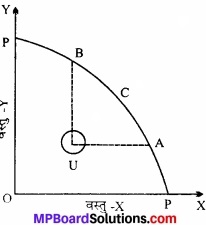
प्रश्न 12.
समष्टि अर्थशास्त्र की विषय-सामग्री को समझाइये?
अथवा
समष्टि अर्थशास्त्र के क्षेत्रों का वर्णन कीजिए?
उत्तर:
समष्टि अर्थशास्त्र की विषय सामग्री-इसकी विषय – सामग्री निम्नलिखित हैं –
1. आय तथा रोजगार का निर्धारण:
आय तथा रोजगार का निर्धारण समष्टि अर्थशास्त्र की मुख्य विषय सामग्री है। आय एवं रोजगार का स्तर प्रभावपूर्ण माँग पर निर्भर करता है। प्रभावपूर्ण माँग कुल व्यय (उपभोग व्यय, विनियोग व्यय एवं सरकारी व्यय) द्वारा निर्धारित होती है।
2. सामान्य कीमत स्तर एवं स्फीति का विश्लेषण:
मुद्रा – स्फीति के कारण उत्पन्न स्फीतिक कीमत वृद्धि वर्तमान विश्व की सबसे कष्टदायक आर्थिक बीमारी है। विकसित एवं अर्द्ध – विकसित दोनों तरह की अर्थव्यवस्थाएँ इससे पीड़ित हैं। प्रो. कीन्स के आर्थिक विश्लेषण के बाद स्फीतिक कीमत वृद्धि का अध्ययन समष्टि अर्थशास्त्र का महत्वपूर्ण अंग बन गया है।
3. आर्थिक विकास के सिद्धांत:
आर्थिक विकास का अर्थशास्त्र, समष्टि अर्थशास्त्र की एक महत्वपूर्ण शाखा है। द्वितीय महायुद्ध के पश्चात् विश्व के अनेक देशों को गुलामी से स्वतंत्रता प्राप्त हुई। इन नवोदित राष्ट्रों में आर्थिक विकास की समस्या को आर्थिक नियोजन की सहायता से हल करने का प्रयत्न किया जा रहा है।
4. वितरण का समष्टि सिद्धांत:
वितरण की अनेक समस्याओं जैसे – कुल राष्ट्रीय आय में उत्पादन के विभिन्न साधनों का पारिश्रमिक कितना है तथा उनमें कुल आय का वितरण किस प्रकार किया जाता है, यह समष्टि अर्थशास्त्र के सिद्धांतों का मुख्य विषय है।
5. राजस्व का सिद्धांत:
राजस्व के अनेक सिद्धांत जैसे – अंतर्राष्ट्रीय व्यापार के सिद्धांत एवं आर्थिक नियोजन के सिद्धांत भी समष्टि अर्थशास्त्र के विषय हैं।
प्रश्न 13.
बाजार अर्थव्यवस्था एवं केन्द्रीयकृत योजनाबद्ध अर्थव्यवस्था में अन्तर स्पष्ट कीजिए?
उत्तर:
बाजार अर्थव्यवस्था एवं केन्द्रीयकृत योजनाबद्ध अर्थव्यवस्था में अंतर –
